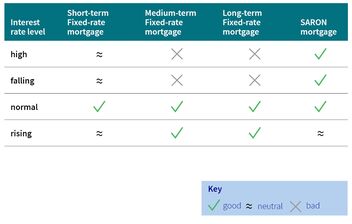
The current state of the Swiss real estate market
Are you interested in investing in the Swiss real estate market, but you are not sure how? No problem! Get the lowdown on the current state of the real estate market. Interest rates, prices, the real estate market: Our blog article tells you how the AXA Mortgage Center assesses these various factors.
A lot of people in Switzerland are concerned about what’s happening on the real estate market. We have noticed a lot of uncertainty lately as property prices climb ever higher in Switzerland and availability becomes more and more limited. And to top it all off, interest rates have gone up. But what is really going on in the real estate market?
Interest rate trends
In the first half of 2022, interest rates in Switzerland ticked upward for the first time in years. This is because of inflation, which has been rising due to increasing energy prices and supply chain problems.
In June 2022, the Swiss National Bank started raising the key interest rate in order to stem inflation. When the key interest rate starts climbing, it’s worth saving your money again. If people keep their money in their bank accounts rather than spending it, the demand for goods goes down and prices stop going up. A higher key interest rate also means that mortgage rates will rise.
Depending on how inflation fares, we could see key rates go higher, which, in turn, would push mortgage rates up even further. The experts at the AXA Mortgage Center expect interest rates to fluctuate over the next few months.
Interest rate trends
Rising mortgage rates could theoretically cause real estate prices to fall. But we are not seeing this right now. In fact, the opposite is happening: Prices on the Swiss real estate market remain elevated because demand is strong.
In our opinion, global politics is the reason behind this trend. In these times of uncertainty, people are increasingly looking for safe investments. Real estate and residential properties are just such an investment.
The coronavirus pandemic further fueled this trend because so many people spent much more time at home, which increased people’s desire for a nice place to live. Since the pandemic, people in Switzerland have become more interested in having a home on a larger lot and with a garden.
Other reasons why real estate prices are rising:
- New housing starts are down, but the population is growing
- Limited land for building
- Construction costs are high because of lack of resources and delayed deliveries
So, since the demand for real estate in Switzerland will continue to outstrip supply, real estate prices – particularly in attractive locations – will likely remain stable.
So which type of mortgage is best for the current interest rate environment?
In most cases, when people buy a house they want to know what type of mortgage is best for them. The answer depends partly on what funds the buyer has available. But the state of the financial markets also plays a big role in choosing a mortgage.
There are two types of mortgages:
- Fixed-rate mortgage: This type of mortgage has a set term and a fixed interest rate. Canceling this mortgage is very expensive. The advantage of a fixed-rate mortgage is that you have a fixed monthly payment so you can easily budget around it. And you don’t have to worry when interest rates start to rise. But this also means that you won’t be able to take advantage of falling interest rates.
- SARON mortgage: This is a variable money market mortgage based on the Swiss Average Rate Overnight (SARON). This solution lets you profit from a drop in interest rates. But it offers less budgeting security as you will have to pay more for your mortgage if interest rates go up.

Despite the interest rate hikes, rates are still low. So a fixed-rate mortgage remains attractive in this environment, especially over the mid or long term.








